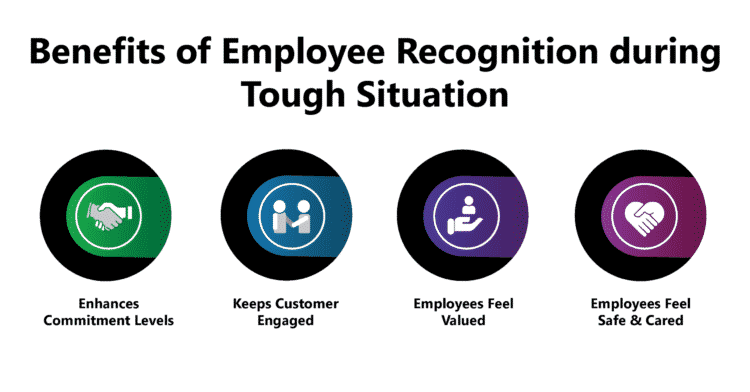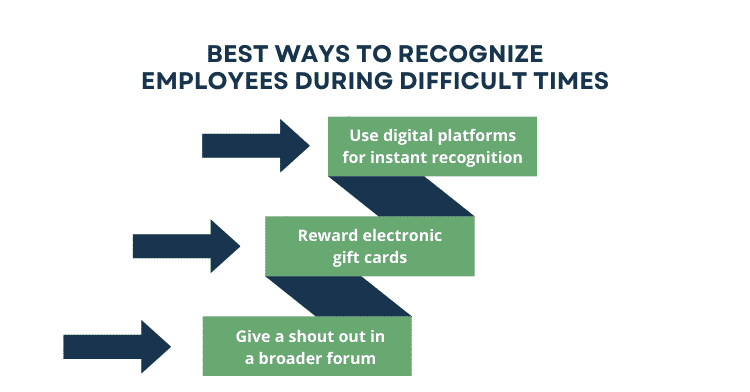1. Continuing employee recognition during difficult times boosts employee morale, commitment, and a sense of safety.
2. Recognizing employees’ efforts under challenging conditions enhances their loyalty and strengthens customer relationships.
3. Effective recognition methods during crises include utilizing digital platforms for instant recognition, offering electronic gift cards, and public acknowledgment on broader social media forums.
4. Maintaining recognition programs during tough times ensures employees feel valued and motivated, leading to long-term organizational benefits.
Many organizations downgrade or temporarily discontinue employee recognition during challenging times due to financial constraints and other pressures. On the contrary, a good employee recognition programme, especially during a crisis, might have a more significant impact than during good times.

The COVID-19 health crisis in 2020 that had engulfed the entire world had given us an opportunity to understand the significance of rewards and recognition during troubled times.
During the pandemic, employees ensured that their organizations could fulfill their commitments to customers.

Most of these employees did so at significant risk to their health and well-being, making it even more crucial for their employers to appreciate their efforts.
Recognizing employees during critical times is essential to keep up their morale and motivate them to keep doing their best.
Even employees who worked from home grappled with challenges ranging from poor network connectivity to an erratic power supply to home-related issues.
Despite these challenges, they strive to deliver projects on time and meet client commitments. Organizations should also recognize their efforts.
While it might seem counterintuitive, continuing with a good employee recognition program can benefit organizations significantly, even during tough times.
Organizations need to recognize the efforts of their employees who are working against all odds to keep their businesses running.
Here are a few benefits of doing so:
1. Enhances their commitment levels
2. Keeps customers engaged
3. Makes them feel valued
4. Makes them feel safe and cared for


When organizations choose to recognize and appreciate their employees even during tough times, it strengthens their sense of belonging and loyalty toward the organization.
This dedication and commitment enable them to complete their tasks and meet deadlines and targets, even in the most challenging situations.

One of the biggest benefits of recognizing employees during difficult times is that they pass on the same sense of comfort and care to their customers which helps in building great long-term relationships.
These customers will likely stay with the organization longer and provide more business opportunities once the situation normalizes.

Appreciating the efforts of employees in highly stressful times assures them of the support of their employers.
It strengthens their belief that their contribution is noticeable to the people who matter the most. It can improve their long-term motivation well beyond the current crisis.

It also helps establish a humanitarian connection between employees and the organization.
The employees feel valued and respected by their employers, ensuring their long-term commitment to the organization.
During difficult times, it is important for organizations to have an appropriate recognition strategy for all types of employees.
These include employees working from home, in the office, or in the field.
Here are a few practical ways in which organizations can recognize their employees during tough times:
1. Use digital platforms for instant recognition
2. Reward electronic gift cards
3. Give a shout-out in a broader forum


Organizations can also utilize digital employee recognition software platforms, such as HiFives, to instantly recognize their employees.
The platform can enable managers and co-workers to send appreciation/ ‘thank you’ emails to their co-workers.
If you cannot thank someone in person, a digital ‘Thank You’ might also work.

Electronic gift cards are an effective way to recognize employees, and using them during difficult times is a sensible approach.
Employee recognition software platforms, such as HiFives, offer employees hundreds of gift cards that they can receive via email.
Employees can use these gift cards to buy groceries, other essentials, fashion and lifestyle products, dining and food delivery, travel and entertainment, etc.
Platforms like HiFives enable employees to choose their preferred gift card brands based on their specific needs and preferences.

Acknowledging and appreciating employees on organization-wide platforms can go a long way in boosting their morale and keeping them motivated.
Digital platforms such as HiFives ensure that recognition of employee achievements can be visible across the organization through digital walls/ boards.
It also enables co-workers to congratulate the winners digitally on the wall. Organizations can utilize their official social media channels to recognize employee achievements.
Employee recognition during difficult times, when done in a timely and effective manner can garner the required support, dedication, and commitment of their employees.

Lead author: Sagar Chaudhuri, the Co-Founder and CEO of HiFives. He is an HR Tech Evangelist with over 25 years of experience in both corporate and entrepreneurial settings. Previously, Sagar has held leadership roles with companies such as Genpact, Infosys, and ICICI Bank. He has an engineering degree from IIT Kharagpur and an MBA from IIM Lucknow. Connect on LinkedIn
To stay updated on the latest HiFives blogs, follow us on Twitter (@MyHiFives)